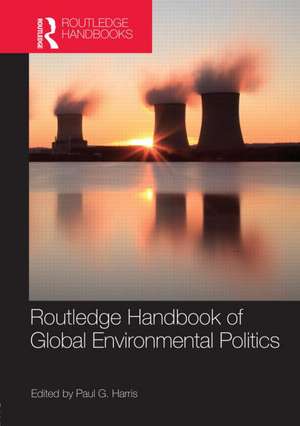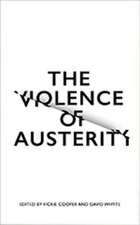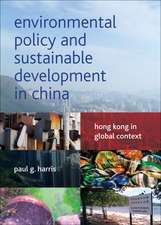Routledge Handbook of Global Environmental Politics
Editat de Harris Paul G., Paul G. Harrisen Limba Engleză Hardback – 25 sep 2013
- Describe the history of global environmental politics as a discipline and explain the various theories and perspectives used by scholars and students to understand it.
- Examine the key actors and institutions in global environmental politics, explaining the role of states, international organizations, regimes, international law, foreign policy institutions, domestic politics, corporations and transnational actors.
- Address the ideas and themes shaping the practice and study of global environmental politics, including sustainability, consumption, expertise, uncertainty, security, diplomacy, North-South relations, globalisation, justice, ethics, participation and citizenship.
- Assess the key issues and policies within global environmental politics, including energy, climate change, ozone depletion, air pollution, acid rain, sustainable transport, persistent organic pollutants, hazardous wastes, water, rivers, wetlands, oceans, fisheries, marine mammals, biodiversity, migratory species, natural heritage, forests, desertification, food and agriculture.
Preț: 1386.81 lei
Preț vechi: 1523.97 lei
-9% Nou
Puncte Express: 2080
Preț estimativ în valută:
265.36€ • 277.81$ • 219.57£
265.36€ • 277.81$ • 219.57£
Carte tipărită la comandă
Livrare economică 07-21 aprilie
Preluare comenzi: 021 569.72.76
Specificații
ISBN-13: 9780415694209
ISBN-10: 0415694205
Pagini: 552
Ilustrații: 2 b/w images, 9 tables and 2 line drawings
Dimensiuni: 183 x 244 x 36 mm
Greutate: 1.09 kg
Ediția:New.
Editura: Routledge
ISBN-10: 0415694205
Pagini: 552
Ilustrații: 2 b/w images, 9 tables and 2 line drawings
Dimensiuni: 183 x 244 x 36 mm
Greutate: 1.09 kg
Ediția:New.
Editura: Routledge
Notă biografică
Paul G. Harris is the Chair Professor of Global and Environmental Studies at the Hong Kong Institute of Education.
Cuprins
1. Introduction: Delineating global environmental politics Part I: Explaining and understanding global environmental politics 2. The discipline of global environmental politics: a short history 3. Mainstream theories: realism and rationalism 4. Alternative theories: constructivism, Marxism and critical approaches 5. The study of global environmental politics: strategies for research and learning 6. Advanced scholarship: interdisciplinary research at the science-policy interface Part II: Actors and institutions in global environmental politics 7. States: nations, sovereignty and the international system 8. International organizations: global and regional environmental cooperation 9. International environmental regimes: formation, effectiveness and trends 10. International environmental law: sources, principles and innovations 11. Environmental foreign policy: crossovers among levels of governance 12. Comparative environmental politics: domestic institutions and actors 13. Corporations: business and industrial influence 14. Transnational actors: Nongovernmental organizations, civil society and individuals Part III: Ideas and themes in global environmental politics 15. Sustainability: foundational principles 16. Consumption: institutions and actors 17. Expertise: specialized knowledge in environmental politics and sustainability 18. Uncertainty: risk, technology and the future 19. Environmental security: international, national and human 20. Environmental diplomacy: international conferences and negotiations 21. North-South relations: colonialism, empire and international order 22. Globalization and the environment: markets, finance and trade 23. International justice: rights and obligations of states 24. Environmental justice: pollution, poverty and marginalized communities 25. Environmental ethics: philosophy, ecology and other species 26. Participation: public opinion and environmental action 27. Environmental citizenship: global, local and individual Part IV: Key issues and policies in global environmental politics 28. Energy and climate change 29. Stratospheric ozone depletion 30. Air pollution and acid rain 31. Sustainable transport and infrastructure 32. Persistent organic pollutants 33. Hazardous wastes 34. Water, rivers and wetlands 35. Pollution and management of oceans and seas 36. Fisheries and marine mammals 37. Biodiversity, migratory species and natural heritage 38. Forests 39. Desertification 40. Food and agriculture















